|
 |
Home
» Ukrainians in Canada Ukrainians in Canada
26.12.2012
There is no argument that the Holodomor of 1932 to 1933 is one of the greatest atrocities ever faced by a nation, and thus it is a shame that the members of the general international community are unaware of this devastating, man-made famine that took the lives of millions of Ukrainians. Literally translated, “Holodomor” is a Ukrainian term meaning “murder by starvation.” During these years of the famine, every other nation of the Soviet Union experienced population growth while Ukraine lost millions of lives. This evidence most basically points to the policy of collectivization and the consequent famine as a maneuver of genocide against the Ukrainian nation as opposed to having been established for economic reasons. Today, the efforts to raise awareness of this tragic genocide against the Ukrainian nation are stronger than ever, and hopefully the entire international community will soon recognize the cruel injustice that was the Holodomor. A brief examination of the history of the time preceding the famine is necessary in order to wholly understand the causes of the Holodomor. Before achieving independence in 1991, the Ukrainian people had always been under foreign rule. In the late nineteenth century, the Russian Empire dominated the Ukrainian territory – the breadbasket of Europe – with oppressive policies banning any educational or Ukrainian cultural expression. However... |
Detailed...
|
26.12.2012
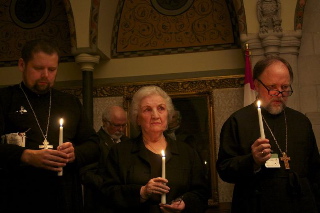 On Thursday November 22nd, as part of National Holodomor Awareness Week, the Ukrainian Canadian Congress (UCC) in cooperation with the Canada-Ukraine Parliamentary Friendship Group (CUPFG) and the Embassy of Ukraine in Canada held a solemn commemoration on the occasion of the seventy-ninth anniversary of the Ukrainian Holodomor of 1932-33 on Parliament Hill. The Holodomor was one of the most heinous crimes in the history of mankind, the result of a deliberate plan by Stalin to subjugate Ukrainians and destroy the Ukrainian nation. For over seventy years the Soviet regime concealed the truth and misled the West in the hope that its memory would be lost forever. The service on Parliament Hill was led in prayer by: Very Reverend Dr. Father Peter Galadza of the Metropolitan Andrey Sheptytsky Institute in Ottawa, Very Reverend Father Ihor Okhrimtchouk of Assumption of the Blessed Virgin Ukrainian Orthodox Cathedral in Ottawa; and Very Reverend Dr. Ihor Kutash of St. Mary's the Protectress Ukrainian Orthodox Church in Montreal. UCC President Paul Grod spoke on behalf of the... On Thursday November 22nd, as part of National Holodomor Awareness Week, the Ukrainian Canadian Congress (UCC) in cooperation with the Canada-Ukraine Parliamentary Friendship Group (CUPFG) and the Embassy of Ukraine in Canada held a solemn commemoration on the occasion of the seventy-ninth anniversary of the Ukrainian Holodomor of 1932-33 on Parliament Hill. The Holodomor was one of the most heinous crimes in the history of mankind, the result of a deliberate plan by Stalin to subjugate Ukrainians and destroy the Ukrainian nation. For over seventy years the Soviet regime concealed the truth and misled the West in the hope that its memory would be lost forever. The service on Parliament Hill was led in prayer by: Very Reverend Dr. Father Peter Galadza of the Metropolitan Andrey Sheptytsky Institute in Ottawa, Very Reverend Father Ihor Okhrimtchouk of Assumption of the Blessed Virgin Ukrainian Orthodox Cathedral in Ottawa; and Very Reverend Dr. Ihor Kutash of St. Mary's the Protectress Ukrainian Orthodox Church in Montreal. UCC President Paul Grod spoke on behalf of the...
|
Detailed...
|
26.12.2012
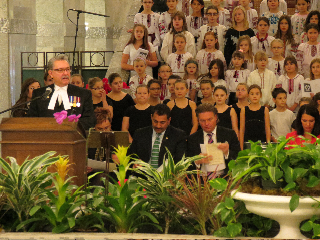 On November 20, 2012 at noon in the rotunda of Alberta’s Legislature Building, Albertans came together to honour those who perished in the tragic 1932-1933 famine-genocide of the Ukrainian people under Soviet rule. This tragic event was marked with a very solemn remembrance on the 4th anniversary of the coming into force of Alberta’s Ukrainian Famine and Genocide (Holodomor) Memorial Day Act. The Act recognizes the Holodomor and institutes a memorial day in Alberta to mark this tragedy every 4th Saturday in November annually. The very moving commemoration mourned the victims of the atrocity of the manmade famine-genocide which took place in Ukraine 1932-1933. Hosted by the Honourable Gene Zwozdesky, MLA, Speaker of the Legislative Assembly of Alberta and sponsor of the Act in 2008, and Ms. Genia Leskiw, MLA Bonnyville-Cold Lake, Chair of the Advisory Council on Alberta Ukraine Relations, it brought together members of the government, the Ukrainian community and On November 20, 2012 at noon in the rotunda of Alberta’s Legislature Building, Albertans came together to honour those who perished in the tragic 1932-1933 famine-genocide of the Ukrainian people under Soviet rule. This tragic event was marked with a very solemn remembrance on the 4th anniversary of the coming into force of Alberta’s Ukrainian Famine and Genocide (Holodomor) Memorial Day Act. The Act recognizes the Holodomor and institutes a memorial day in Alberta to mark this tragedy every 4th Saturday in November annually. The very moving commemoration mourned the victims of the atrocity of the manmade famine-genocide which took place in Ukraine 1932-1933. Hosted by the Honourable Gene Zwozdesky, MLA, Speaker of the Legislative Assembly of Alberta and sponsor of the Act in 2008, and Ms. Genia Leskiw, MLA Bonnyville-Cold Lake, Chair of the Advisory Council on Alberta Ukraine Relations, it brought together members of the government, the Ukrainian community and
|
Detailed...
|
11.11.2012
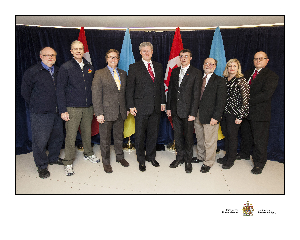 Efforts by Ukrainian researchers and academics to restore Ukraine’s historical memory and national identity was the focus of a tour by Ruslan Zabily involving six North American universities, nine Ukrainian communities and meetings with high ranking government officials. Ruslan Zabily is Director of the National Museum Memorial to the Victims of Occupation Regimes "Prison at Lonsky” in Lviv, Ukraine. The now Museum was used as a prison by the NKVD-KGB and Gestapo. It held political prisoners, innocent men, women and, even, children - Poles, Jews and, mostly, Ukrainians. Today, it is a prestigious government museum, memorial and research institution. The two week tour in October 2012 was sponsored by the member organizations of the Canadian Conference in Support of Ukraine (CCSU): League of Ukrainian Canadians (LUC), League of Ukrainian Canadian Women (LUCW), Ukrainian Youth Association of Canada (CYM), Society of Veterans of UPA, and... Efforts by Ukrainian researchers and academics to restore Ukraine’s historical memory and national identity was the focus of a tour by Ruslan Zabily involving six North American universities, nine Ukrainian communities and meetings with high ranking government officials. Ruslan Zabily is Director of the National Museum Memorial to the Victims of Occupation Regimes "Prison at Lonsky” in Lviv, Ukraine. The now Museum was used as a prison by the NKVD-KGB and Gestapo. It held political prisoners, innocent men, women and, even, children - Poles, Jews and, mostly, Ukrainians. Today, it is a prestigious government museum, memorial and research institution. The two week tour in October 2012 was sponsored by the member organizations of the Canadian Conference in Support of Ukraine (CCSU): League of Ukrainian Canadians (LUC), League of Ukrainian Canadian Women (LUCW), Ukrainian Youth Association of Canada (CYM), Society of Veterans of UPA, and... |
Detailed...
|
11.11.2012
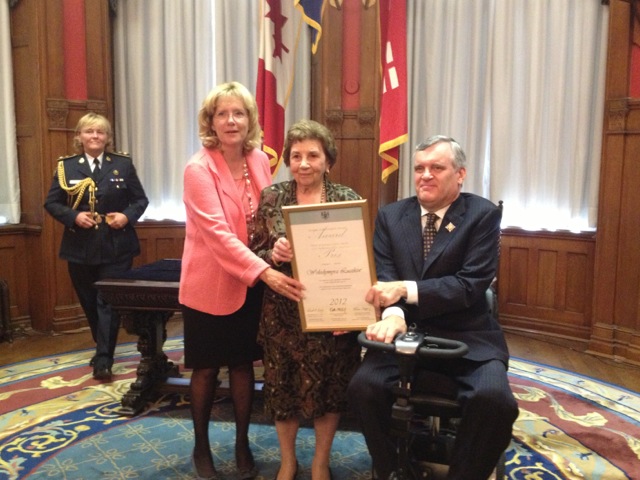 Wolodymyra Luczkiw has been a dedicated volunteer in the Canadian Ukrainian community for over 50 years. Wolodymyra is very proud of her Ukrainian heritage and has spent many years with the Ukrainian Canadian Research and Documentation Centre and the Ukraine Heritage Museum. She believes strongly that history needs to be remembered and preserved for future generations. In her community, Wolodymyra is known for her warmth and compassion to both the people she works with and those she cares for. She approaches everything she does with a true sense of dedication and diligence and is a... Wolodymyra Luczkiw has been a dedicated volunteer in the Canadian Ukrainian community for over 50 years. Wolodymyra is very proud of her Ukrainian heritage and has spent many years with the Ukrainian Canadian Research and Documentation Centre and the Ukraine Heritage Museum. She believes strongly that history needs to be remembered and preserved for future generations. In her community, Wolodymyra is known for her warmth and compassion to both the people she works with and those she cares for. She approaches everything she does with a true sense of dedication and diligence and is a... |
Detailed...
|
11.11.2012
Following the collapse of the Communist system in Central and Eastern Europe and the dissolution of the USSR, Ukraine and other countries of the former socialist camp ended up in identical starting positions with respect to the creation of a democratic society. However, in each of these countries this process evolved according to a particular scenario. Above all, the need emerged to find a path toward the reconciliation of two different groups in society: those who had waged a struggle against Soviet totalitarianism and those who had served it. On the whole, the process of overcoming the consequences of Soviet totalitarianism in the countries of Central and Eastern Europe is taking place according to the following scenario: condemnation of the Soviet (Communist) regime, the creation of special bodies to deal with questions of national memory, the publication of socially significant information on the activities of the Communist punitive-repressive system (considered a state secret until recently), political lustration, the popularization of liberation movements, the creation of a new European identity, and... |
Detailed...
|
11.11.2012
On Friday, 28 September 2012, a trilingual plaque recalling Canada's first national internment operations was unveiled, and blessed, at the Holy Ghost Ukrainian Catholic Church, in the Whitney Pier district of Sydney, Nova Scotia. Established in 1912 this parish was grievously affected by the internment operations, with many of its menfolk - coalminers and iron workers - branded as "enemy aliens," some of whom were then interned in camps at Amherst, Halifax, and elsewhere across Canada. Placed by the Ukrainian Canadian Civil Liberties Association, in collaboration with Cape Breton's Ukrainian community and with the financial support of the Canadian First World War Internment Recognition Fund, the plaque is now permanently installed inside this historic church. During the unveiling ceremony... |
Detailed...
|
11.11.2012
It is with great sadness that the Ukrainian Canadian Congress learned of the passing of Roman Melnyk on October 3, 2012, following an unexpected and brief struggle with cancer, at the age of 71. “On behalf of the Ukrainian Canadian Congress and all its constituent member organizations, I would like to express our deepest condolences to Roman’s wife Tania and to all his family and friends,” stated Paul Grod, UCC President. “Roman will be remembered as someone who made a positive difference through his work in television as well as his generosity as a volunteer and financial supporter of the community. The Ukrainian Canadian community has suffered a great loss with his passing and his wonderful sense of humour will be dearly missed by all those who had the pleasure of knowing him.” Roman Melnyk was a lawyer and former television executive. He believed... |
Detailed...
|
06.10.2012
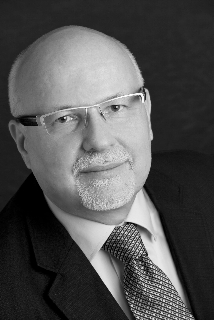 Recently the Canadian Institute of Ukrainian Studies published volumes 33-34 (2008-2009) of the Journal of Ukrainian Studies. This 628-page quadruple issue, titled Tentorium honorum, is a collection of thirty-three essays presented to Professor Frank E. Sysyn on the occasion of his sixtieth birthday. Professor Sysyn is a distinguished scholar of Ukrainian and Polish history and has been a major figure in the development of Ukrainian historical studies in the United States, Canada, Ukraine, and Germany for more than three decades. He is a professor in the Department of History and Classics at the University of Alberta and, since 1990, director of the Peter Jacyk Centre for Ukrainian Historical Research at CIUS and editor-in-chief of its Hrushevsky Translation Project. Professor Sysyn is the author of Between Poland and the Ukraine: The Dilemma of Adam Kysil, 1600-1653 (1985), Mykhailo Hrushevsky: Historian and National Awakener (2001), and studies on the Khmelnytsky Uprising, Ukrainian historiography, and early modern Ukrainian political culture. He is also coauthor, with Serhii Plokhy, of Religion and Nation in Modern Ukraine (2003)... Recently the Canadian Institute of Ukrainian Studies published volumes 33-34 (2008-2009) of the Journal of Ukrainian Studies. This 628-page quadruple issue, titled Tentorium honorum, is a collection of thirty-three essays presented to Professor Frank E. Sysyn on the occasion of his sixtieth birthday. Professor Sysyn is a distinguished scholar of Ukrainian and Polish history and has been a major figure in the development of Ukrainian historical studies in the United States, Canada, Ukraine, and Germany for more than three decades. He is a professor in the Department of History and Classics at the University of Alberta and, since 1990, director of the Peter Jacyk Centre for Ukrainian Historical Research at CIUS and editor-in-chief of its Hrushevsky Translation Project. Professor Sysyn is the author of Between Poland and the Ukraine: The Dilemma of Adam Kysil, 1600-1653 (1985), Mykhailo Hrushevsky: Historian and National Awakener (2001), and studies on the Khmelnytsky Uprising, Ukrainian historiography, and early modern Ukrainian political culture. He is also coauthor, with Serhii Plokhy, of Religion and Nation in Modern Ukraine (2003)... |
Detailed...
|
10.09.2012
On May 7, 2012 the Consul General of the Republic of Poland, the Hon. Marek Ciesielczuk, awarded former Canadian M.P. and M.P.P. Yuri Shymko with the Medal of Gratitude established by the European Solidarity Center to commemorate the 30th anniversary of the birth of Solidarity. Yuri Shymko was among a select group of international recipients who, during the 1980’s, supported Solidarność and the democratic opposition in Poland in its struggle for freedom and democracy. The Certificate of Honour accompanying the Medal of Gratitude states that “Yuri Shymko contributed through his great sacrifices and support to the rebuilding of a liberated Poland and the unification of Europe”... |
Detailed...
|
|
|
| NEW NAME OF BUDUCHNIST CREDIT UNION |
|
|
|
|




